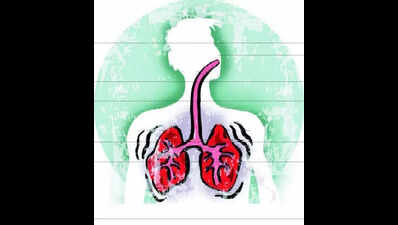Asthma cases surge thanks to poor air quality, late diagnosis | Bengaluru News

Bengaluru: Asthma is tightening its grip on the city, with hospitals reporting a 25% rise in cases and a 15% increase in hospitalisations over the past five years. Doctors attribute the spike to deteriorating air quality, rampant construction dust, and frequent weather fluctuations, noting that the condition is becoming both more common and harder to manage.
“Following Covid, recovery from viral infections is taking longer, and many people without prior asthma history are now developing post-viral wheeze requiring long-term inhalers. Either way, asthma outcomes are getting worse,” said Dr Vivek Anand Padegal, director of pulmonology at Fortis Hospital.
Dr Darshana Reddy, senior consultant at Altius Hospital, highlighted that over 70% of asthma cases in Bengaluru remain undiagnosed. “Prevalence has jumped from 9% to 25% in five years, especially due to air pollution and underdiagnosis. Symptoms like cough and wheezing are often mistaken for other respiratory issues. Since the lockdown ended, increased vehicular emissions and low mask use worsened air quality. In children alone, it’s as high as 19.4%,” she said.
Dr Pooja Bajaj, associate consultant pulmonologist at SPARSH Hospital, reported a 20-25% annual rise in cases across age groups. She cited rapid urbanisation, pollen-heavy plantations, and poor indoor air as key contributors.
Bengaluru’s shifting climate, with sudden temperature drops and high humidity, worsens symptoms, especially in pre-monsoon seasons. “Nearly one in every 10 children in urban Bengaluru now complains of some form of chronic respiratory distress,” Dr Bajaj said. “These chronic conditions spike seasonally, especially now during the pre-monsoon, peak pollen period.”
While inhalers manage mild symptoms, doctors warn that severe cases often require hospitalisation. “Patients arrive with breathlessness, chest tightness, and low oxygen — signs that regular inhalers are no longer enough,” said Dr Bajaj.
BOX 1
PRECAUTIONS
* Don’t ignore a persistent cough or wheezing
* Don’t self-medicate without consulting doctor
* Don’t skip or stop medication suddenly
* Don’t expose yourself to smoke or strong fumes
* Don’t delay treatment during flare-ups
BOX 2
WHY TIMELY DIAGNOSIS MATTERS
Delayed diagnosis and inconsistent treatment worsen asthma. Inhaled corticosteroids remain the gold standard, yet many avoid them because of stigma or stop using them when symptoms ease. Air pollution continues to be a major trigger, but in India, rural exposure to biomass fuels such as wood and charcoal for cooking adds to the risk. Even among those diagnosed, non-compliance is a growing issue. Some patients stop treatment when symptoms ease or avoid carrying inhalers due to social stigma.
— Source: Dr Ishan Capoor, associate consultant pulmonologist at Narayana Health
















